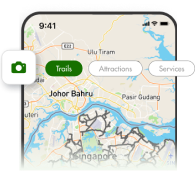When in a nature park or nature reserve
Our nature reserves and nature parks are home to diverse animal and plant species. To enjoy your visit and allow them to flourish, you should observe the following dos and don'ts in addition to park etiquette.
Do | Do not |
|---|
Observe all signs and information boards and stay on designated trails marked out on them. When you step off the trails, you risk disturbing or trampling on endangered plant saplings. You may also get lost in the nature park or nature reserve. | Take home any flora or fauna.
All plants and animals in nature parks and nature reserves are protected.
Take home nothing but fond memories - it is our responsibility to conserve all living things in our nature parks and nature reserves. |
Stay on the correct trail for your own safety. Hiking trails are designed for hikers only and mountain bike trails are strictly for cyclists only. Find out more about the hiking etiquette and mountain biking etiquette you should follow when visiting a nature park. | Inline skate, skateboard or ride a motorised mobility device. You should also not cycle in areas where cycling is strictly not allowed such as in Sungei Buloh Wetland Reserve and the Central Catchment Nature Reserve. |
Keep your volume down. Forest animals are shy and elusive. It is important to remain quiet to be able to spot them. | Play loud music. Noise will disturb the animals and deprive you of the chance of seeing them. Bring your dogs or other pets. Dogs are known to scent-mark places they visit, affecting the movement of native animals. They may also bark at or harass native animals found within nature parks or reserves. |
Admire the wildlife from a distance. You should use optical aids such as binoculars to observe them. | Approach any animal if you encounter them.
For your safety and the well-being of the animal, stay calm and back away slowly.
Refer to the animal advisories to find out what you should do if you encounter a wild animal.
|
Keep food inside your bag. Eating or carrying food in your hand may attract monkeys to snatch it and hurt you in the process. You should also avoid carrying plastic bags in the presence of monkeys as they have been conditioned to associate plastic bags with food. | Feed the wildlife or release any animals.
Both these actions may upset our fragile ecosystem and cause more harm than good.
Released animals may also not be able to adapt and survive in the new environment. |
Observe opening and closing times. All our nature reserves and nature parks are open from 7am - 7pm.
They are closed at night to allow our native fauna, many of which are nocturnal, to feed and breed without being disturbed.
| Enter forested areas during and immediately after bad weather. For your safety, seek shelter during bad weather. |
Fish only in designated areas. | Wade in streams and reservoirs.
You may contaminate the water and disturb the biodiversity living in these natural water bodies.
|
Apply permit for group activities
To minimise disturbance to the natural environment, you must apply for a permit in advance if you are organising group activities such as guided walks or group tours within a nature reserve or nature park network for the following group sizes:
Find out how to apply for a permit for group activities:
Apply permit for the commercial use of photos or videos
To protect biodiversity and allow visitors to enjoy nature, you must apply for a permit at least 2 weeks in advance if you intend to film or take photographs for commercial use on-location in all nature parks and nature reserves.
Find out how to apply for a permit for commercial filming and photography.
During bad weather
Seek shelter during bad weather. Do not enter forested areas during and immediately after bad weather.
Check the weather forecast before visiting.






